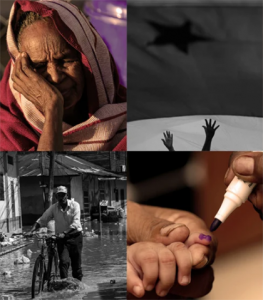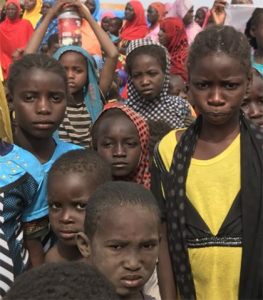Humanitarian outlook for 2021
With borders slammed shut, jobs lost and aid increasingly difficult to deliver, the COVID-19 pandemic has exacerbated humanitarian crises across the globe.
So what will happen in 2021 as the pandemic continues and the rollout of vaccines in many part of the world still a way off?
 We look at the current and emerging issues that will loom large on the humanitarian landscape.
We look at the current and emerging issues that will loom large on the humanitarian landscape.
With a plethora of conflicts across the globe, the effects of climate change emerging and growing food insecurity, the challenges have never been greater.
Conflict
Conflict accounts for about 80 per cent of humanitarian needs on the planet.
The UN has made conflict prevention and resolution a central pillar of its agenda. But there is little evidence of lasting progress. In South Sudan, the unification of rival armies has stalled, in neighbouring Central African Republic, elections in December supposed to set the troubled country on a path to recovery instead sparked widespread fighting.
In Colombia, a ground breaking 2016 peace agreement has been opposed by the new government, which is accused of turning a blind eye to the killing of former FARC guerrillas and civil rights activists.
Sudan’s fragile transition to civilian rule, brokered by the African Union is under threat from systemic economic problems that will require generous international aid.
In Afghanistan, it’s now not clear if the new US government will honour a deal with the Taliban over the withdrawal of American forces. There are concerns that Taliban will overthrow the Afghan government as soon as the US leaves.
 Ethiopia is suffering a conflict driven humanitarian disaster with tens of thousands of people fleeing abroad and two million internally displaced. The UN says 20 million people are in need of assistance.
Ethiopia is suffering a conflict driven humanitarian disaster with tens of thousands of people fleeing abroad and two million internally displaced. The UN says 20 million people are in need of assistance.
The nearly ten years of the conflict in the Central African Republic (CAR) has killed at last 6,000 people, and possibly thousands more; it has displaced 700,000 internally and has created almost 300,000 cross-border refugees.
Violence recently abated in the CAR after armed groups signed a peace deal with the government in 2019.
But a disputed election has triggered a new round of violence and a rebel offensive that threatens to derail the agreement and drag the country – which has some of the highest humanitarian needs per capita of any nation in the world – back into civil war.
The United Nations estimates that in 2021, 2.8 million Central Africans – or 57 per cent of a total population estimated to be 4.9 million – will need humanitarian assistance and protection.
The conflict in Yemen has been called “the world’s worst humanitarian crisis” by the UN. Funding for aid in the strife-torn nation has decreased but violence in some parts of the country is increasing.
Widespread hunger and disease as well as stalled peace talks mean the conflict will continue to cause hardship.
COVID-19 and the global recession means there may be less money and international capacity available for monitoring, oversight and peace building in these places.
Climate
Thirteen of the 20 countries most vulnerable to climate change are also in the grip of a humanitarian crisis, and most have an active conflict.
Climate-linked threats are stacking up and locking some societies into a permanent battle.
Add in the economic fallout from COVID-19 and durable solutions seem far off.
Experts say that what might normally be short-term crises are becoming increasingly drawn out as repeat disasters multiply in quick succession.
For example, in 2020 Southeast Asia faced an unprecedented typhoon season which affected 32 million people and, according to Red Cross, will have repercussions for years to come.
Climate change is now part of the language of humanitarianism and the UN’s refugee agency, UNHCR, has called it “the defining crisis of our time”.
Food insecurity
2021 is seeing the threat of famine in in Burkina Faso, Nigeria, and Yemen, South Sudan and Southern Madagascar.
Conflict and displacement are likely to create more poverty and hunger in parts of Afghanistan, Cameroon, Central African Republic, the Democratic Republic of the Congo, Mozambique, and Niger, according to the UN.
Economic crises will make life more precarious for millions of poor people in Haiti, Lebanon, Sudan, Syria, Venezuela, and Zimbabwe, the UN says.
The issues in long-standing food security “hotspots” have been complicated by COVID-19, which has made it harder for aid workers to reach those in need.
Global food commodity prices hit a six-year high in December last year and may increase further.
Job losses and recession-hit economies, brought on by COVID-19 lockdowns, will create more poverty and more hunger around the globe, aid agencies say.
Global humanitarian needs increased in 2020 – much of it related to food security – but only 46 per cent of required funding needs were met.
The good news is the arrival of effective vaccines, which is beginning to lift fears of a long-running recession. The OECD predicts a global recover by the end of 2021.
Infectious disease
One of the many effects of the COVID-19 pandemic was to halt routine immunisation and vaccination programs across the globe.
As a result, preventable diseases are worsening and delivering healthcare has become more complex.
Public health experts say that vaccination campaigns for measles, polio and other preventable diseases were cancelled as COVID-19 struck.
Coverage dropped to 50 percent in some areas, and at least 94 million children have missed out. Immunisations have resumed in some countries, but UN agencies have warned of “explosive outbreaks”.
New outbreaks of polio were reported across Africa and in Yemen in 2020.
The same issues that thwarted immunisation programmes and healthcare before the pandemic will also be barriers to ensuring COVID-19 vaccines reach the world’s most marginalised people.
Women and girls
Women and girls are disproportionately impacted by conflicts and disasters; and they face even more hardship from the effects of the COVID-19 pandemic.
The UN has warned that years of progress in the rights and health of women are at risk of being lost because of the pandemic. Violence against women has risen by 25 per cent during lockdowns across the globe.
And aid agencies say health services for women, including critical maternal health, have taken a back to COVID services in some countries.
Gender based violence has increased in camps for displaced people in countries such as Greece, South Sudan and Mexico, with women sometimes forced into lockdown with their abusers.
Child marriages rose in places like Bangladesh and Cameroon as schools closed and families struggled financially under the weight of lockdown measures, the UN has reported.
COVID-19 lockdowns have also curtailed woman’s access to shelter and the courts. And girls’ access to education has also suffered as a result of the pandemic.
Another issue is the lack of data. Only a handful of governments around the world have collected statistics that look at the impact of COVID-19 on women and girls, a gap that makes it hard to determine just how much help they will need.
Politics and authoritarianism
Across the world corrupt, incompetent and criminal administrations are making life tougher for some of the world’s most vulnerable people.
The once robust Venezuelan economy is in ruins and oil earnings are set to diminish even further. Venezuelans who have not yet fled the country face an even deeper humanitarian crisis this year.
As President Nicolás Maduro tightens his repressive grip on power, an Organisation of American States report warns that the number of Venezuelan refugees and migrants could swell to more than 7 million in 2020.
For Venezuelans who face tighter borders and enter other countries illegally – or who lack expensive-to-obtain official documents and passports – jobs and public services will remain out of reach.
The military coup in Myanmar has serious implications for human rights in the country.
In 2017 the military waged a campaign against the ethnic Rohingya people that the UN has said bordered on ethnic cleansing.
The NGO Human Rights Watch (HRW) says that senior members of the Myanmar military are guilty of war crimes and serious abuses of civilians.
HRW, in a recent report, says that more than 80 governments have used the COVID-19 pandemic as an excuse to silence critics and adopt new repressive laws criminalising or stifling free speech.












